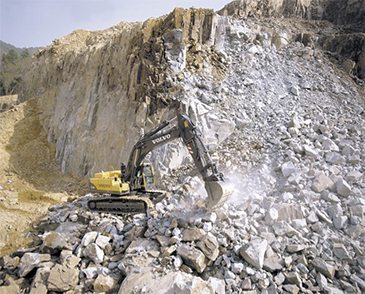
In Shirpur, western India, four Volvo EC240 B Prime Series LC excavators are working through the night to provide essential water supplies for local communities in Maharashtra’s dry summer season.
Maharashtra, the third biggest state by area in India, covers 307,731 km2, and its western region contributes the highest amount to India’s industrial output and gross domestic product (GDP). Remarkably, if it was a nation in its own right; it would be the world’s tenth most populous country – with more people than Mexico.
Even though the lucrative region is growing economically, Mother Nature retains its hold over the district. The region was unfortunately hit by the infamous Latur earthquake in 1993, devastating 52 villages and killing 20,000 people. That’s not all: Maharashtra hardly receives any rainfall, with eight districts of the Marathwada region in Maharashtra currently battling severe drought. The situation is especially acute in the Jalna district where incredibly many claim the last time water flowed through their taps was over five years ago.
Water is a precious – but vital – commodity and many people now receive deliveries from passing tankers. But with water sources such as local lakes starting to dry up, it’s time to launch a different plan of action.
A watery solution
On behalf of the Rainwater Harvesting Project, the brainchild of local politician Amrishbhai Patel, involves rainwater harvesting that will provide an independent water supply during regional water restrictions. This concept is not new in developed countries and is often used to supplement the mains supply.
This water-capturing initiative aims to provide a valuable water source for the municipal area during the arid summer months by harvesting any rainwater that does fall in a series of small surface reservoirs.
These reservoirs are a vital way of storing water that would otherwise be lost as it flows out to sea through the Arunawati River. The quality of captured rainwater is good and usually sufficient for most household essentials. Its purity even reduces the need for detergents.
Shirpur Construction was established in 1995 and now employs 100 people. After 18 years the company’s management and staff are still passionate about improving living conditions in the surrounding community.
“The Rainwater Harvesting Project is a dream come true for so many people in the city,” says Rajendra Deore, director of Shirpur Construction. “It could even become a game-changer for India’s water conservation policies – we will have enough water for the next 25 years!”
Digging deep to deliver
Just over a year into the project, work is moving at an astonishing pace thanks to Shirpur Construction’s fleet of four Volvo EC240 excavators. These low-emission crawler excavators have high lifting, breakout and tear out forces – and are ideal for the tough operating environment.
“The excavators need to work in hard rock conditions, digging deep into the parched earth. So it is essential that they are both strong and durable. Thankfully Volvos are certainly up to the job,” says Deore.
Not only are they tough, Deore also thinks that Shirpur Construction’s Volvo machinery has brought considerable savings on operating costs. “Our savings in fuel consumption add up to more than 75% of our bank loan interest. When you factor in productivity gains and virtually zero breakdowns, investing in Volvo equipment has made economic sense for us,” he adds.
A bright future
Despite climate change forecasts, these communities can expect to enjoy ‘renewable rain’ at acceptable volumes for years to come. Rainwater harvesting systems generally have low running costs, providing water at the point of consumption. Further widespread benefits include reduced water treatment for regional supply systems, pumping, operation and associated costs as well as reduced storm water processing costs and greenhouse gas emissions.
Shirpur Construction’s participation in the Rainwater Harvesting Project is an exciting endeavour for the company, adding its reputation for excellence in infrastructure and school building projects.
“It’s a project the entire team is proud to be associated with,” says Deore. “For sheer scale of operations, the benefits that will accrue to the larger community, this project stands alone.”
With plans to bring in more Volvo EC240s as the scope of the work expands into new territories, the company is looking forward to the challenge.
“We are thrilled at the prospect of bringing harvested rainwater to other dry areas in Maharashtra – and with our fleet of Volvos we are confident we can deliver!” Deore concludes.
Source: Volvo Construction Equiment
Tags News
 Constructionshows
Constructionshows